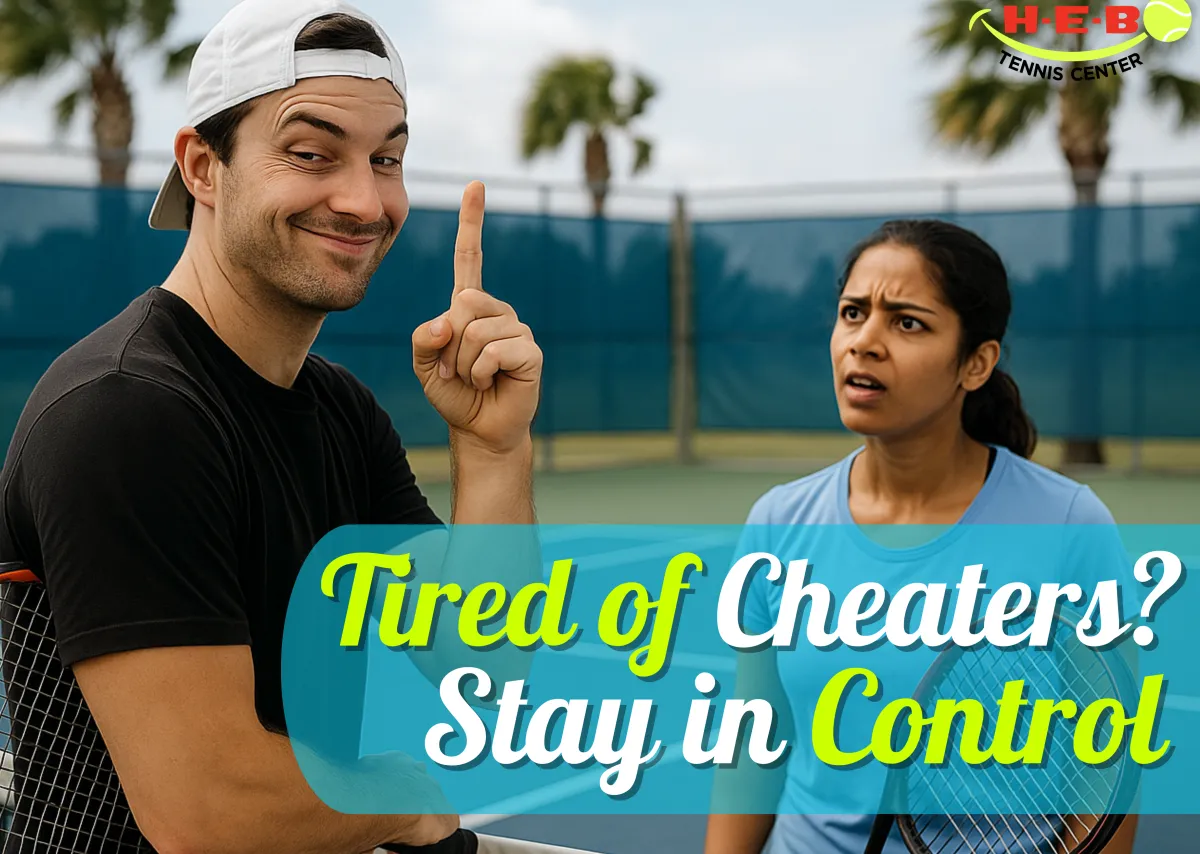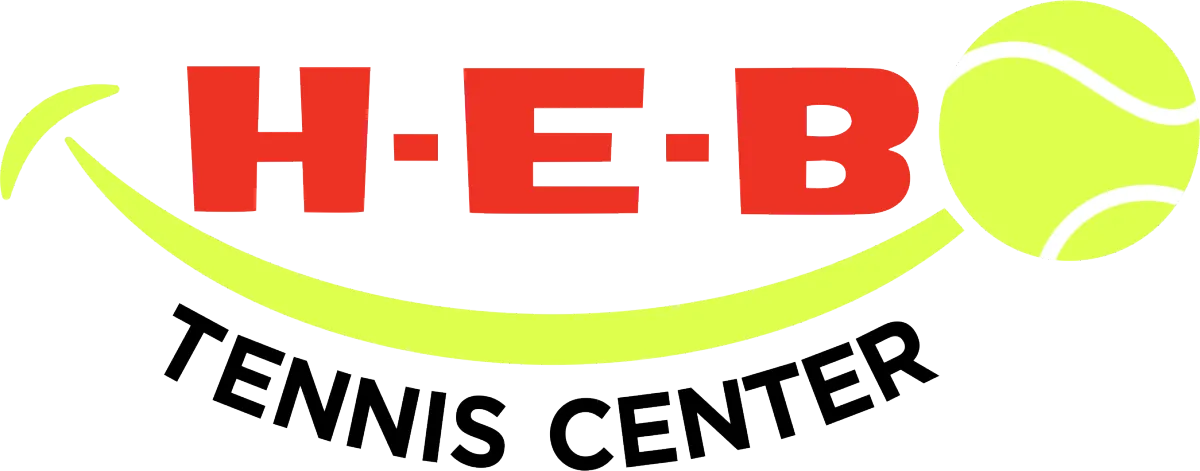TENNIS
TIPS
News/Events

How to Handle Cheating in Tennis
Quick Takeaways
Cheating happens in tennis, from practice matches to tournaments — and it rattles players more than almost anything else.
You can’t control dishonest opponents, but you can control how you respond.
Always call the score out loud before every point — it protects you and builds confidence.
Staying calm, breathing, and refocusing after a bad call is more powerful than arguing.
Anger can either break your game or fuel it — channel it into stronger play.
In the long run, integrity and composure matter more than a stolen point.
The Problem No One Likes to Talk About
It’s fall in Harlingen, and the courts at Pendleton Park are alive with competition. High school matches, league play, and weekend tournaments are in full swing. For players of all levels — from juniors to adults — it’s one of the most exciting times of the year.
And yet, there’s a challenge many players eventually face but few want to talk about openly: the opponent who doesn’t play fair.
Maybe your shot lands clearly inside the baseline, and they call it out.
Maybe the score “changes” in their favor halfway through the game.
Maybe they twist the rules or act so confident in their false calls that you start doubting yourself.
Dishonesty on the court is frustrating not only because it feels unfair, but because it shakes your concentration. Suddenly, you’re not just battling their forehand — you’re battling their integrity. And if you’re not careful, that frustration will unravel your whole match.

Why Dishonesty Hits So Hard
Unlike most sports, tennis depends on players to police themselves. You call your own lines, announce your own score, and trust your opponent to do the same. When someone bends that trust, it doesn’t just cost you a point — it undermines the very foundation of the game.
Worse still, it can get inside your head. You replay the call in your mind, get angry, and lose focus on the next point. Before you know it, your game is off track.
The irony is this: the dishonest player often wins not because of their skill, but because of your reaction. The real weapon isn’t the bad call — it’s the frustration it causes in you.
First, Take Care of the Basics
Before we talk about psychology, let’s talk about habits. The simplest habits often save you the most grief:
Call the score out loud before every point. Do it confidently, even if it feels repetitive. This one step prevents confusion, protects you against “misremembered” scores, and shows you’re in control of the match.
Track games at every changeover. Write it down or say it clearly with your opponent. When everyone knows where things stand, there’s less room for manipulation.
Correct calmly. If there’s disagreement, don’t get heated. Simply say, “I had it as 40–30.” Your composure is your credibility.
These sound small, but they’re powerful. By keeping order, you protect your own mental game.
The Temptation to Cheat Back
When someone cheats you on court, it’s almost instinct to think: “If they do it to me, why shouldn’t I do it to them?” That flash of temptation is human — it feels like evening the score. But the moment you go down that path, you’ve lowered yourself to their game. You stop focusing on tennis and start playing a contest of dishonesty.
Cheating back may give a quick sense of revenge, but it costs far more: your credibility, your concentration, and your self-respect. The better choice — and the tougher one — is to hold the line. Let their behavior expose them, while you play with integrity. Others will notice. More importantly, you will know you stayed true.
In the end, your honesty is your strength. Don’t let their weakness drag you down.
The Part You Can Control
The most freeing — and most difficult — truth is this: you cannot control your opponent’s honesty. You can’t force someone to call lines fairly. You can’t make someone keep score correctly.
But you can control your own response. That’s where the real growth happens.
Every time you choose composure instead of anger, every time you reset instead of spiraling, you strengthen your game in ways no dishonest opponent can take away.
The Mental Playbook
Here’s how to keep your head clear when dishonesty strikes:
Pause and breathe. After a bad call, take a step back. Bounce the ball. Breathe deep. Remind yourself: one point doesn’t define this match.
Anchor your focus. Use a simple phrase like “See the ball” or “Bounce, hit.” This keeps your mind in the present moment instead of reliving the past call.
Reframe the challenge. Instead of seeing your opponent as ruining the match, tell yourself: They’re giving me a chance to practice composure under pressure. If I can handle this, I can handle anything.
Play with excellence. Let your tennis do the talking. Win the next point so cleanly that there’s no doubt. Nothing silences dishonesty like undeniable play.
When It Becomes Too Much
In tournaments, if the behavior continues, you may be able to ask for an official. Protecting fairness isn’t petty — it’s part of the game.
But in practice matches, leagues, or casual play, you won’t always have that option. In those cases, the choice becomes yours: finish the match with composure, or walk away from players who consistently poison the joy of the game.
Not every match is worth your energy. And knowing when to conserve that energy is part of growing as a player.
Turning Anger Into Energy
It’s natural to get angry when someone cheats you. Don’t deny it. But don’t let it control you either. Anger is like fire: it can burn you, or it can fuel you.
Channel it into sharper footwork, more focused swings, steadier serves. Let it push you to play at your highest level. That way, the very tactic meant to break you becomes the thing that sharpens you.
Bigger Than Tennis
The truth is, you’ll face dishonesty outside the court too. In life, there are people who cut corners, twist facts, or act with no integrity. They may get ahead for a moment. They may even look like they’re winning.
But character wins in the long run.
The court is your training ground for this. Every time you handle a dishonest opponent with strength and self-control, you’re practicing how to deal with bigger challenges off the court. You’re learning that dignity matters more than a single point.
Why It Matters at H-E-B Tennis Center
At the H-E-B Tennis Center in Harlingen, we don’t just teach forehands and backhands. We teach life lessons. On these courts at Pendleton Park, kids, beginners, and adults learn that tennis is about more than winning — it’s about character.
When players face dishonesty, they discover what kind of competitor they really are. Will they lose themselves in frustration, or rise above it with strength? That choice builds habits that last far longer than a season.
That’s why our clinics, lessons, and programs focus not only on skills, but on resilience. Because whether it’s a bad call in a match or a challenge in life, the way you respond matters more than what’s thrown at you.
Final Thoughts
Dishonest opponents may steal a point. They may even steal a match. But they can’t steal what matters most: your integrity.
When you call the score clearly, play with composure, and channel your energy into better tennis, you prove something bigger than who won the match. You prove that you’re the kind of player — and person — who can’t be shaken by dishonesty.
And that will serve you far beyond the game.
Ready to Build Your Game?
Train at the H-E-B Tennis Center in Harlingen, inside Pendleton Park. Whether you’re a beginner learning the basics, a junior preparing for tournaments, or an adult looking to sharpen your competitive edge, our clinics and lessons prepare you for the physical and mental battles of tennis.
Because here, it’s not just about strokes. It’s about strength.


Facebook
Instagram